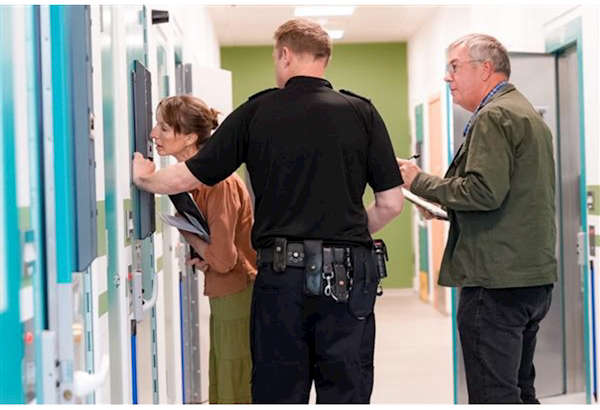
Volunteers living in Devon and Cornwall are being sought to a carry out a crucial role to ensure people detained in custody are being treated fairly and humanely, regardless of why they are there.
The Office of the Police and Crime Commissioner (OPCC) for Devon and Cornwall relies on Independent Custody Visitors (ICVs) to carry out inspections within their local area to check on the welfare of detainees and the facilities in which they are held.
The assessment criteria includes that their cell is clean, they have access to food that caters for different diets, water, distraction items and to make sure they have been offered a solicitor.
Currently, the OPCC benefits from having 15 ICVs who have a genuine interest in criminal justice and helping the OPCC carry out its statutory duty of scrutinising Devon & Cornwall Police’s custody management.
In the last financial year from April 2024 to March 2025, there were 25,055 detentions in Devon and Cornwall. During that time, 135 visits were carried out by ICVs at custody centres throughout Devon and Cornwall, including Exeter, Torquay, Plymouth, Barnstaple, Newquay and Camborne.
Additional ICVs from all backgrounds and experiences, including those from underrepresented groups, are now required to ensure that all areas across the peninsula are covered.
Recruitment has now begun, and we are looking to bolster our visitor numbers particularly in Cornwall and Plymouth, but we welcome applications from volunteers who can visit any of the custody centres in Devon and Cornwall.
Applicants must be 18 years old or over, independent of the police service, living or working in Devon and Cornwall, and having been resident in the UK for the three years prior to application. ICVs are reimbursed for expenses such as car mileage and parking costs while carrying out their role.
Cary, a lawyer by profession, lives in Devon and has been an ICV for the past three-and-a-half years. She carries out two custody visits a month, usually in Exeter and Torquay. She volunteers for a number of different organisations but says she finds being an ICV particularly rewarding because it combines personal interests in criminology, the criminal justice system and helping others.
Cary recalled: “What made me apply to become an ICV was a young person I knew had recently been arrested and was kept in a cell overnight in a different police force area. I felt like they had not really been looked after with empathy.
“Shortly afterwards, I saw an advert looking for ICVs in Devon and Cornwall. You can fit it around work if you are not retired as visits are carried out during the day, evening or weekends.
“The detainees we meet are a complete mixture of people. No one has to talk to us and we are very clear that we don’t want to know who they are or why they are there. Instead, we are there to check on their welfare, accompanied by a member of custody staff at all times, and ICVs always make visits in pairs.
“The custody staff are very nice and are open and honest with us about challenges as we are able to highlight them in our report such as staffing issues.
“Being an ICV has become a very important aspect of my life. I have met some very interesting people and it’s enjoyable as it’s a completely different kind of volunteering experience. It’s also great to part of important external monitoring on behalf of the OPCC.”
She added: “I would absolutely recommend being an ICV – but it’s not for the fainthearted or for people who are too judgemental. My personal view is that you have to believe detainees are human beings worthy of respect and dignity, even though they have been arrested.”
Explaining the importance of ICVs, Police and Crime Commissioner (PCC) Alison Hernandez said: “These incredible volunteers are members of the local community who are completely independent of the police and selflessly give up some of their spare time to check on the treatment of people detained in custody, the conditions in which they are being held and ensure that their rights and entitlements are being observed.
“Their role is so important because for many people, arriving in a custody suite can be a daunting and frightening experience and they may not be aware of their rights or entitlements. The scheme offers protection and confidentiality to detainees and provides reassurance to me that the custody environment is working well or an ability to flag vital issues not being addressed promptly.
“It is vital that custody environments are safe and respectful, and without ICVs this would far more difficult to monitor. I am pleased to report that no significant issues have been raised following ICV visits so far this year.”
The Police Reform and Social Responsibility Act placed a statutory obligation on all PCCs in England and Wales to have an effective ICV scheme in its police force area.
ICVs visits police stations in a pair, unannounced, and are escorted to the custody centre by a Custody Sergeant. They independently decide which detainees to visit, prioritising anyone who is vulnerable, women and children.
Strict rules of confidentiality mean that ICVs are not told detainees’ names or why they are in custody, and detainees have to give their consent to be visited.
ICVs can also inspect custody records with the detainee’s consent, which are a record of everything that happens while a detainee is in custody. ICVs can use this information to corroborate any statements made by the detainee and to ensure that the detainee’s rights and entitlements are being followed.
Following a visit, ICVs submit a report of their findings to the OPCC and the local custody inspector. Immediate areas of concern can be raised with the Custody Sergeant or the Custody Inspector.
For a description of the role and the specifications required please visit Vacancy: Volunteer Independent Custody Visitor – Your voice in policing or email OPCC@dc-pcc.gov.uk

 Rural Affairs officers welcome new law to crack down on livestock attacks
Rural Affairs officers welcome new law to crack down on livestock attacks
 Hospiscare needs your help with a unique ‘double your money’ fundraising challenge
Hospiscare needs your help with a unique ‘double your money’ fundraising challenge
 County Council invites residents to help shape 2026/27 budget
County Council invites residents to help shape 2026/27 budget
 ‘Pop-up’ vaccination clinics being held in several communities this week
‘Pop-up’ vaccination clinics being held in several communities this week












